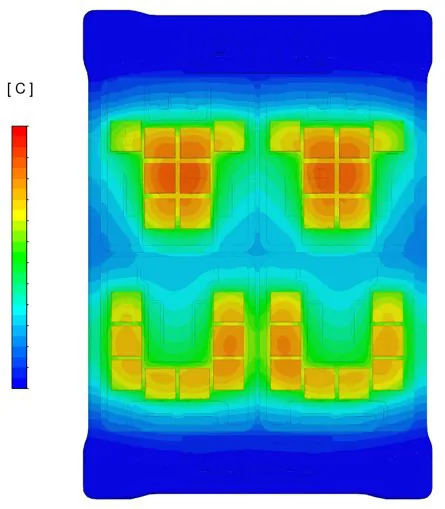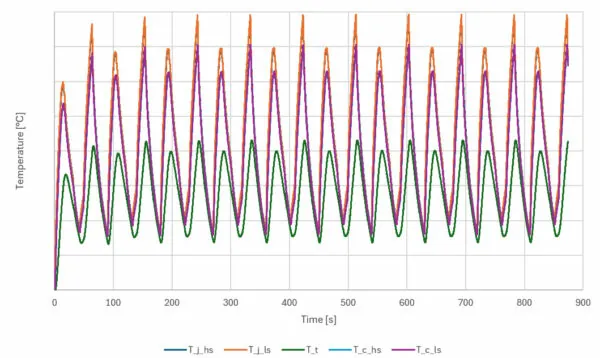Let’s get PowerizeD: Pioneering a Greener, Smarter Future for Power Electronics

Alongside key partners such as ABB, Alstom, RISE, KTH, and Scania, EDRMedeso is proud to be a key player in the groundbreaking PowerizeD project, an initiative designed to revolutionize the efficiency, reliability, and integration of power electronic systems. By leveraging advanced intelligence and cutting-edge technologies, the project aims to address critical challenges in the field of power electronics and drive substantial improvements across multiple dimensions. So, what are the project’s objectives and how is EDRMedeso and simulation contributing to goals?
The first objective of PowerizeD is to enhance the efficiency of power electronics devices and systems at all levels, from individual components to complete systems. By implementing intelligent control and optimization measures, the project seeks to reduce power losses by more than 25% compared to the current state-of-the-art. This improvement applies to both silicon-based devices and advanced wide-bandgap materials.

Temperature distribution in a power module, calculated by CFD (computational fluid dynamics) simulation.
The second objective focuses on integrating advanced intelligence to enhance the reliability and sustainability of power electronics. By leveraging novel materials and advanced assembly technologies, the project aims to increase the lifespan of power electronics devices and systems by at least 30% compared to current standards. This will be achieved through improved control and a deeper understanding of degradation physics.
The third objective seeks to ensure the robust and safe operation of power electronics applications. By introducing intelligent control mechanisms, the project aims to prevent device destruction under all operating conditions, including random and challenging failure scenarios such as short circuits. This will allow for the full utilization of modern power semiconductor benefits and reduce the necessary robustness margin by 10-15%.
The fourth objective of PowerizeD aims to push the boundaries of power electronics integration by enhancing connectivity and interfaces throughout the development life cycle. By transitioning data from analog to digital, the project seeks to enable an active and integrated control and monitoring approach.
Simulation is instrumental in developing optimized power electronics components and systems. By integrating advanced simulation tools and expertise in digital twins, we enable precise modeling and dynamic optimization of power electronics systems, ensuring they operate at peak efficiency and contribute to a greener future.
When it comes to degradation modelling and lifetime estimation, simulation-based digital twins can play a major role. Temperature is a key factor here, and we can predict the real-time temperature in critical areas where it is difficult and impractical, if not impossible, to accurately measure with sensors. With the help of simulations, we develop virtual sensors for this purpose.
Our contribution in the project is to develop simulation models and digital twins to improve efficiency and reliability of power electronics, both in device and system levels. With an increase in operational frequency and a demand for compactness, design of optimized power electronics relies more and more on simulation.
In PowerizeD, we develop high-fidelity multiphysics models to analyse electro-thermal behaviour of the power modules. This is crucial to accurately calculate current, losses, and temperature distribution. But these high-fidelity models are often large and slow, and cannot be used for system-level studies and in digital twins.
The solution is reduced order models (ROMs), that we build using state-of-the-art technologies based on high-fidelity simulation data. These ROMs are able to quickly (and of course with accuracy) simulate the outputs of interests, for instance hot spot temperature.
Another topic of interest for us at PowerizeD is EMC (electromagnetic compatibility). Power electronics devices can generate unwanted electromagnetic noise (either conductive or radiative) that can potentially be harmful for other devices or even humans. The noise must be limited, and simulation makes it possible to discover and fix potential issues early in the design stage.
“EDRMedeso is proud to contribute to the PowerizeD project, leveraging our expertise in simulation and digital technologies to drive forward the future of power electronics. By collaborating with leading industry partners, we are committed to advancing efficiency, reliability, and sustainability in this critical field.”
Mostafa Valavi, Project Lead at EDRMedeso

Time-varying temperatures in critical areas of a power module, calculated by ROM for a specific operational duty cycle.
EDRMedeso’s involvement in the PowerizeD project is a testament to our commitment to advancing the field of power electronics. By contributing our expertise in simulation, with a particular focus on digital twins, we help drive the project’s ambitious objectives. Together with our partners, we are paving the way for a more efficient, reliable, and sustainable future for the power electronics industry.
PowerizeD is an innovative EU funded project aiming to develop breakthrough technologies of digitized and intelligent power electronics to enable sustainable and resilient energy generation, transmission and applications.
It brings together industry leaders, academic institutions, and technology providers to address the critical challenges faced by the power electronics industry.
More information about PowerizeD and EDRMedeso’s contribution to the project
